 |
| Extra large takenoko -- MacGyver'ed to the seat tube. |
I did not ride that much over Golden Week, using the time to recuperate a bit from doing the full 200, 300, 400, 600 km series of brevets over the preceding month, and with other commitments on top of a normal class schedule at my university.
On Saturday, April 30, I rode the rebuilt Voyage Voyage to Chichibu with Jerome, Peter J, and Peter's friend Daniel. After a 90+ minute soba lunch stop, the three of them headed for Shigasaka Pass and a long loop and evening return. I went a bit further, but then turned around and headed for Honjo Waseda and the shinkansen back to Tokyo.
It was a very nice day all around, including the solo ride. You can see the photos and ride route on Strava. 167kms in all. I left home 25 minutes late after some last minute bicycle tweaks, and pushed hard to catch the others (including a Strava "PR" and 60/2200 all-time on the oft-traveled 5km stretch of Setagaya Dori west of Sangenjaya), met Jerome first at the end of the Tamagawa path in Fuchu, and Peter and Daniel at Oume.
As I neared the end of the ride, I even got to race a steam locomotive full of tourists at Nagatoro.
It was easy to keep up with the train on Voyage Voyage along a flat roadway. Eventually, after taking this video, I raced ahead. But of course, I knew that eventually the train would win the race. I thought of the ballad of John Henry, who competed with a steam drill at pounding railroad ties to lay new track, and died with his hammer in his hand. But which version of the song?
Johnny Cash?
Paul Robeson?
Bruce Springsteen?
BB King, narrated by Denzel?
Harry Belafonte?
Mississippi John Hurt?
Pete Seeger (folk / labor activist)?
Leadbelly (blues)?
Billy Strings (bluegrass)? It is an American classic.
-------------------------------
The other 100km+ ride was on Friday, May 6, on the RAMAX. This was a Golden Week ride, but a few minutes after leaving home, I realized that it was no longer Golden Week! Friday was a workday and everyone was back at it. The early roads were full of trucks in town hauling massive pieces of buildings to construction sites ... but empty of vacationers in the countryside! Of course, Monday also had been a workday ... but had been nothing like this. Apparently many companies had taken Monday off, but all were back at work on Friday. Schools also seemed back in session -- not just my university but elementary school students heading on their commutes before 7AM.
A headwind slowed me, and was a few minutes late to meet Peter J at our regular starting point along the Tamagawa just northwest of Komae. We called Jerome. He was still in bed, having ridden several days mid-week, and was not coming along. Peter J said he would head out with me and then, as planned turn around so as not to push an iffy knee too much. We decided to head for Wada Pass via Daigo Rindo.
The last time I went up here, the road was partially washed away in places. Now it has all been restored with nice new asphalt. It is still a rindo, however, with moss, plenty of leaves and some rocks. I like to go up Wada this way (no traffic at all), but prefer other routes down. Peter J climbed with me to 500m elevation, then turned back for the trip home. I pressed on to the top (~740m elevation) and then down to the pass (~700m elevation). I did not climb quickly, but at least I did the entire climb without a foot down. The descent down the west side (Ura Wada) was exhilarating, as usual. The RAMAX was "fun to ride" going both up and down.
 |
| No GW traffic on the rindo climb to Wada! |
 |
| RAMAX at Wada Pass -- the classic photo spot |
 |
| Koi Nobori on Ura Wada |
I then faced a difficult issue. Where to go next? Kobu Tunnel? Or Tsuru Pass? Or Bijotani? Or head south to Route 76 and Doshi? In the end, I decided to head toward Uenohara and further west from there. Maybe I would go over Sasago Pass? Or I could try one of the climbs south of Sarubashi area that I had never done. Now that I was alone, I was aiming for a most-of-day ride, home before dinner.
I decided to try Suzugane Pass, a route I had somehow never taken in all these years! I could see on my smartphone that after cresting the pass and descending to the south, I would need to then do the shorter climb to the tunnel at Hinazuru Pass and down through Akiyama in order to return toward Tokyo. This was a lovely route. The only real traffic after leaving Tokyo was on Route 20 between Uenohara and Sarubashi, and that was far lighter than normal. The weather was perfect.
 |
| Looking back at Uenohara from Route 20 |
 |
| At Suzugane Pass |
 |
| Maglev track descends valley, Hazy Fuji in the background |
 |
| Looking back downhill and downstream, toward Tsuru |
Once in Akiyama, I stopped at Tsuruya, better known to expat cyclists as "the manju place in Akiyama." I ordered a Miso Manju. 150 yen ($1.15). It was , served with vegetables and green tea. I could digest fully while riding as the descent continued for at least the next 8-10kms. There were flatter sections and -10% ramps--reminding me how hard this little valley is to climb up in the other direction especially on a hot day. I passed one tunnel entrance on my left that led back to Uenohara. ... I don't remember ever having taken that either. But I kept going down the valley. At the bottom, instead of climbing up the South rim of the valley to meet Route 76, as I have always done in the past, I continued on a road that would loop around to the North, eventually meeting the route I would have taken if I had gone through the tunnel ... in time to go through another tunnel and onto a descent to Uenohara.
 |
| Tsuruya, The Manju Shop |
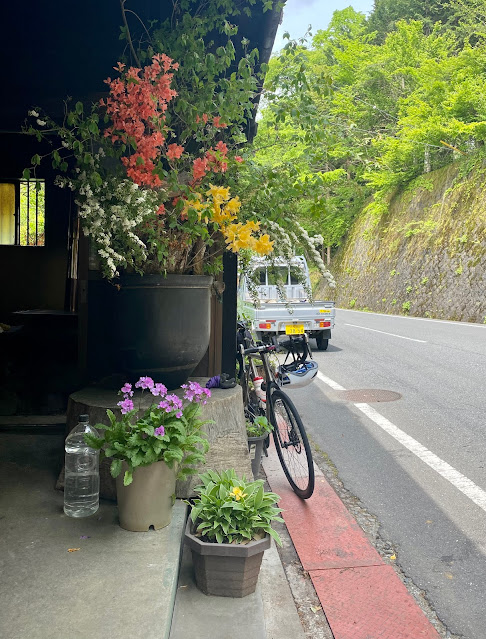 |
| Always lovely flowers here, and little/no traffic. |
 |
| Vegetable and tea make the manju go down, make the manju go down |
 |
| GW traffic on Route 35 in Akiyama |
 |
We used to call this spot "The Vending Machines" in Akiyama.
Now it is just another "Happy Drink Shop". |
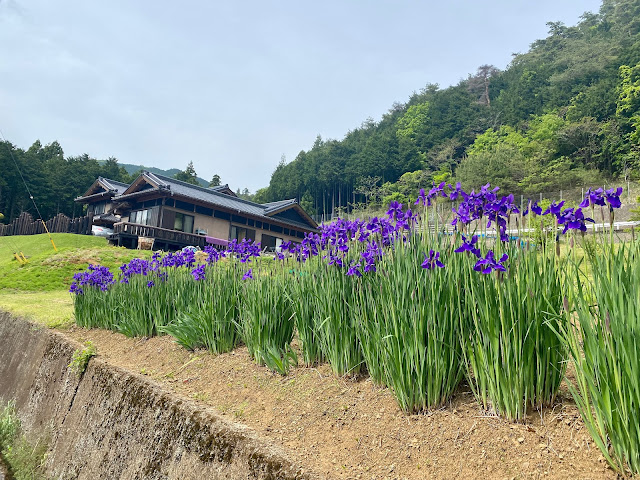 |
| Beautiful Akiyama |
Along the way, I came across an unmanned roadside vegetable stand. The only offering was takenoko -- bamboo shoots. 3 huge shoots, priced at 300 or 400 yen. Takenoko is my wife's favorite Spring delicacy ... so I wanted to take one home and see if I could learn to cook it. But I had not brought a rucksack, and the huge shoots were too big for my jersey pockets or my underseat bag.
One of the shoots, the thinnest of the three, looked as if it might fit inverted into my bottle cage. I deposited 300 yen in the coin box, and put the takenoko in the bottle cage, moving the empty water bottle to my rear jersey pocket. The inverted takenoko fit the bottle cage, but I realized it was so top heavy and large that it would flop around and fall out. But wait, I had some zip ties, for exactly this purpose -- to secure items to the bicycle! Two daisy-chained zip ties worked to secure the stalk, and I could ride, with only a modest rub of the takenoko against the inside of each leg.
By the time I approached Uenohara, I realized that I would seriously chafe my legs if I went too much further, ... so I decided to get a snack and hop the train. My timing was not great ... after I rinkoed the RAMAX and got to the ticket gate, I could see the next train was not for 35 minutes. I bought and drank a cold beer. Only 125 kms for the day, but real climbing up Wada (with its long 13-15% grades), Suzugane, and a shorter climb to Hinazuru Tunnel meant that I did get a decent workout. You can see the statistics and route here on Strava.
 |
| I bought the middle one. |
d
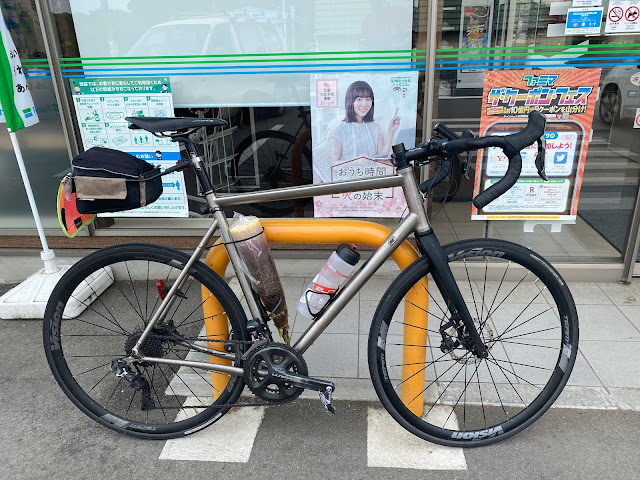 |
| Bike and Takenoko, leaning. |
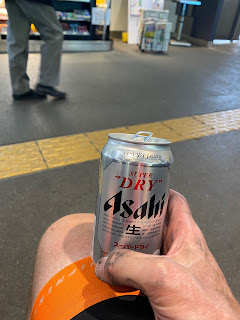 |
| Thank you! |
The lower 2/3 of the takenoko was wrapped in plastic, but it was quite a sight for the other passengers at the back of the local Chuo Line train. The first few minutes of the journey, it kept falling over on the floor of the train. Eventually, one man who had boarded with me at Uenohara reached in his briefcase and handed me a large paper shopping bag. I could fit almost the entire stalk into the bag, and thanked him. One of the hikers across the aisle handed me a smaller plastic bag that I could use to cover the top of the stalk that still protruded from the bag. I thanked her also. Everyone in the back of the last train car felt better about me and my takenoko. The "wa" had been restored.
The next day, I got some "nuka" (ground up rice bran) at our local supermarket, and boiled the takenoko with nuka in a pressure cooker for 20 minutes to remove the "aku" bitterness. I could then slice the edible parts of the plant into pieces for grilling in a skillet. Grilling was the easy part, with some olive oil. They were served with salt to taste. The slices tasted pretty good, and my wife seemed happy with the saga.
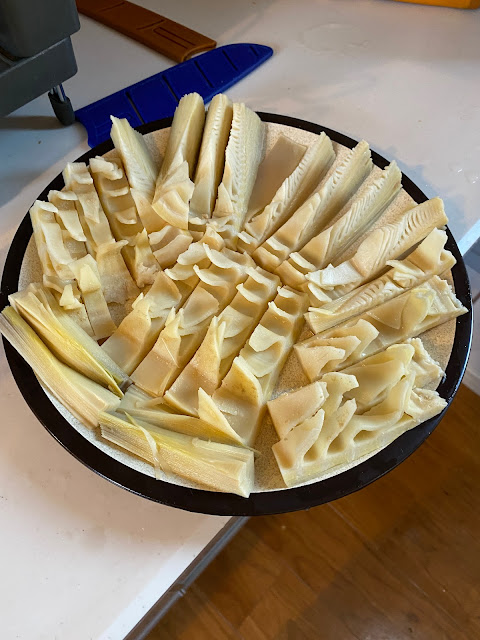 |
| Boiled and ready to grill |
 |
| Grilled with olive oil and salted |




















No comments:
Post a Comment